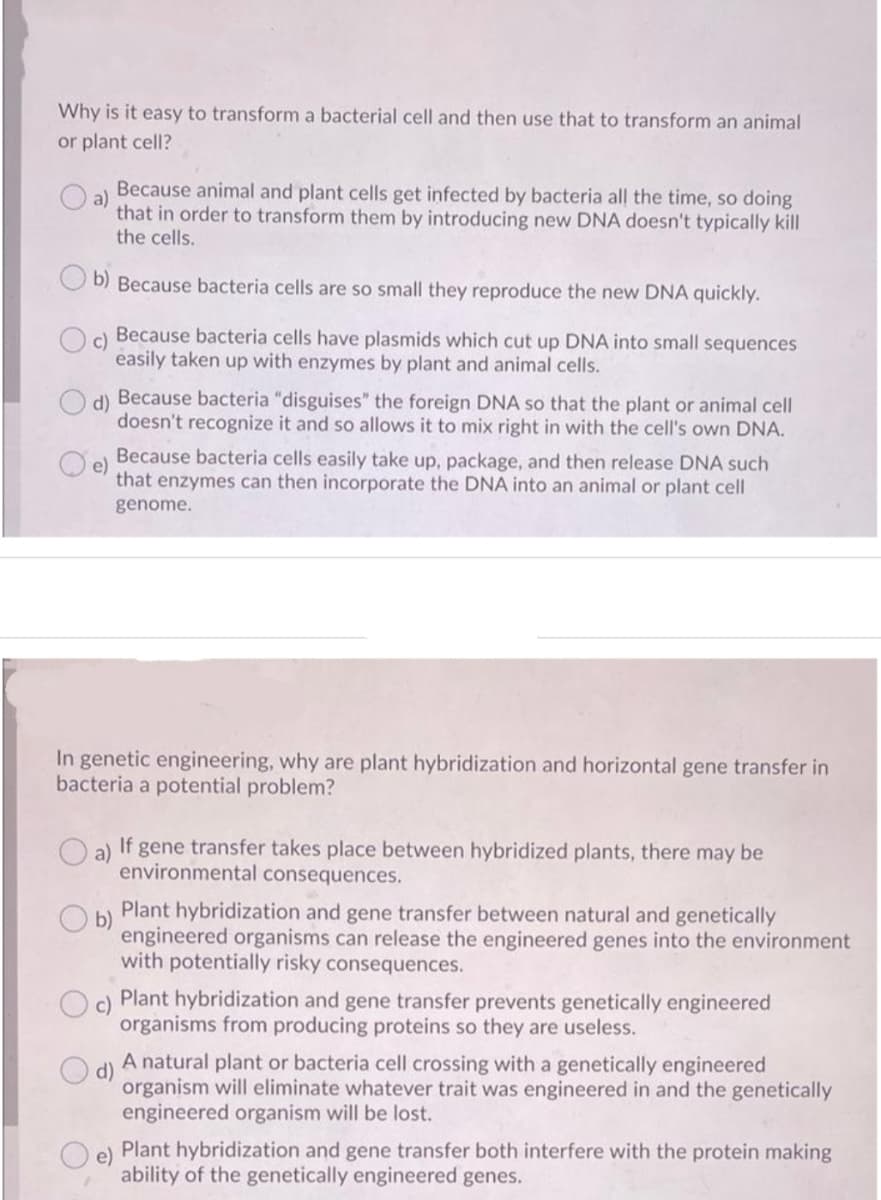Why is it easy to transform a bacterial cell and then use that to transform an animal or plant cell? Because animal and plant cells get infected by bacteria all the time, so doing a) that in order to transform them by introducing new DNA doesn't typically kill the cells. b) Because bacteria cells are so small they reproduce the new DNA quickly. c) Because bacteria cells have plasmids which cut up DNA into small sequences easily taken up with enzymes by plant and animal cells. d) Because bacteria "disguises" the foreign DNA so that the plant or animal cell doesn't recognize it and so allows it to mix right in with the cell's own DNA. Because bacteria cells easily take up, package, and then release DNA such e) that enzymes can then incorporate the DNA into an animal or plant cell genome.
Why is it easy to transform a bacterial cell and then use that to transform an animal or plant cell? Because animal and plant cells get infected by bacteria all the time, so doing a) that in order to transform them by introducing new DNA doesn't typically kill the cells. b) Because bacteria cells are so small they reproduce the new DNA quickly. c) Because bacteria cells have plasmids which cut up DNA into small sequences easily taken up with enzymes by plant and animal cells. d) Because bacteria "disguises" the foreign DNA so that the plant or animal cell doesn't recognize it and so allows it to mix right in with the cell's own DNA. Because bacteria cells easily take up, package, and then release DNA such e) that enzymes can then incorporate the DNA into an animal or plant cell genome.
Human Heredity: Principles and Issues (MindTap Course List)
11th Edition
ISBN:9781305251052
Author:Michael Cummings
Publisher:Michael Cummings
Chapter15: Genomes And Genomics
Section: Chapter Questions
Problem 6QP: Which of the following best describes the process of DNA sequencing? a. DNA is separated on a gel,...
Related questions
Question
Please answer in short and ASAP .

Transcribed Image Text:Why is it easy to transform a bacterial cell and then use that to transform an animal
or plant cell?
Because animal and plant cells get infected by bacteria all the time, so doing
a)
that in order to transform them by introducing new DNA doesn't typically kill
the cells.
b) Because bacteria cells are so small they reproduce the new DNA quickly.
c)
Because bacteria cells have plasmids which cut up DNA into small sequences
easily taken up with enzymes by plant and animal cells.
d)
Because bacteria "disguises" the foreign DNA so that the plant or animal cell
doesn't recognize it and so allows it to mix right in with the cell's own DNA.
Because bacteria cells easily take up, package, and then release DNA sucl
e)
that enzymes can then incorporate the DNA into an animal or plant cell
genome.
In genetic engineering, why are plant hybridization and horizontal gene transfer in
bacteria a potential problem?
a)
If gene transfer takes place between hybridized plants, there may be
environmental consequences.
Plant hybridization and gene transfer between natural and genetically
b)
engineered organisms can release the engineered genes into the environment
with potentially risky consequences.
c)
Plant hybridization and gene transfer prevents genetically engineered
organisms from producing proteins so they are useless.
A natural plant or bacteria cell crossing with a genetically engineered
d)
organism will eliminate whatever trait was engineered in and the genetically
engineered organism will be lost.
e)
Plant hybridization and gene transfer both interfere with the protein making
ability of the genetically engineered genes.
Expert Solution
This question has been solved!
Explore an expertly crafted, step-by-step solution for a thorough understanding of key concepts.
This is a popular solution!
Trending now
This is a popular solution!
Step by step
Solved in 2 steps

Knowledge Booster
Learn more about
Need a deep-dive on the concept behind this application? Look no further. Learn more about this topic, biology and related others by exploring similar questions and additional content below.Recommended textbooks for you

Human Heredity: Principles and Issues (MindTap Co…
Biology
ISBN:
9781305251052
Author:
Michael Cummings
Publisher:
Cengage Learning

Biology 2e
Biology
ISBN:
9781947172517
Author:
Matthew Douglas, Jung Choi, Mary Ann Clark
Publisher:
OpenStax

Human Heredity: Principles and Issues (MindTap Co…
Biology
ISBN:
9781305251052
Author:
Michael Cummings
Publisher:
Cengage Learning

Biology 2e
Biology
ISBN:
9781947172517
Author:
Matthew Douglas, Jung Choi, Mary Ann Clark
Publisher:
OpenStax